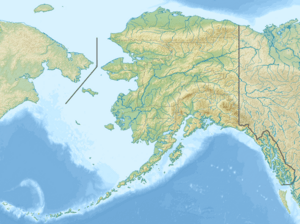Kruzgamepa River facts for kids
Quick facts for kids Kruzgamepa River (Pilgrim River) |
|
|---|---|
|
Location of the mouth of the Kruzgamepa River in Alaska
|
|
| Country | United States |
| State | Alaska |
| District | Nome Census Area |
| Physical characteristics | |
| Main source | Salmon Lake southeast of the Kigluaik Mountains, Seward Peninsula 447 ft (136 m) 64°55′00″N 164°57′30″W / 64.91667°N 164.95833°W |
| River mouth | Kuzitrin River 34 miles (55 km) east-southeast of Teller 20 ft (6.1 m) 65°09′21″N 165°13′21″W / 65.15583°N 165.22250°W |
| Length | 55 mi (89 km) |
The Kruzgamepa River, also known as the Pilgrim River, is a fascinating waterway in Alaska, United States. It flows for about 55 miles (88 kilometers) across the Seward Peninsula. This river is a branch, or tributary, of the Kuzitrin River.
The Kruzgamepa River begins its journey at Salmon Lake. This lake sits at an elevation of about 447 feet (136 meters). From there, the river gently flows downhill. It reaches about 20 feet (6 meters) above sea level at its mouth, where it joins the Kuzitrin River.
The Kuzitrin River then carries the water into the Imuruk Basin. From the basin, the water travels through the beautiful bay of Port Clarence. Finally, it empties into the vast Bering Sea.
Interestingly, the Kruzgamepa River and the Grand Central River are connected. The Grand Central River flows into Salmon Lake. Then, the Kruzgamepa River flows out of Salmon Lake, continuing the water's journey.
Exploring the Kruzgamepa River's Path
Salmon Lake is where the Kruzgamepa River starts. This lake is located in a wide valley. The valley lies at the southern base of the Kigluaik Mountains.
The Kruzgamepa River first flows towards the northeast. It then curves around the eastern end of the mountain range. After that, it heads northwest. This path leads it to the top of the Imuruk Basin.
The area where the upper Kruzgamepa River collects its water is called a drainage basin. This region was once known as the Golden Gate mining district. Today, it is part of the Kougarok mining district.
The Kruzgamepa River flows through a wide valley. This valley is filled with gravel. Near where Iron Creek joins the river, you can see wide, flat areas of gravel. These "terraces" are about 50 feet (15 meters) above the water. Much of this gravel came from ancient glaciers. These glaciers once flowed down from the Kigluaik Mountains.
A Look at the River's Past and Discoveries
People have explored this area for valuable minerals in the past. However, these explorations did not find huge amounts of anything.
Iron Creek is the biggest stream that flows into the Kruzgamepa from the east. It was considered important for finding minerals.
Willow Creek is another stream, about 3 miles (5 kilometers) long. It flows into the Kruzgamepa from the south. This happens about 8 miles (13 kilometers) upstream from Iron Creek.
Near its mouth, Willow Creek flows through a small rocky canyon. This canyon is about 50 feet (15 meters) deep. On both sides of the canyon, there are flat areas covered with gravel. These flat areas are like an old riverbed. The creek has carved its current, deeper path into this older valley floor.
The rocks under the ground here are mostly limestone. There are also layers of quartz schist. These formed from ancient sediments. Sometimes, other rocks called greenstones are found mixed in. These rocks are angled in a way that crosses the river's path.
Slate Creek is about 2 miles (3 kilometers) long. It also joins the Kruzgamepa from the south. It meets the river about 2 miles (3 kilometers) upstream from Willow Creek. The types of rocks found near Slate Creek are similar to those near Willow Creek.
People have searched for gold in both Willow Creek and Slate Creek. They have done this almost every year since 1901. Some gold was indeed found in these creeks.
In 1904, a company explored a high, flat area of gravel. This area was on the east side of the Kruzgamepa. It was located between Slate and Willow creeks. The company planned to bring water from Salmon Lake. They wanted to wash for gold using a method called hydraulicking. This method uses powerful jets of water to break down gravel and find gold.
More to Explore
 | Jessica Watkins |
 | Robert Henry Lawrence Jr. |
 | Mae Jemison |
 | Sian Proctor |
 | Guion Bluford |


